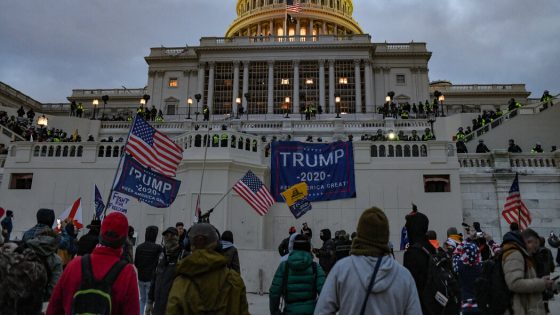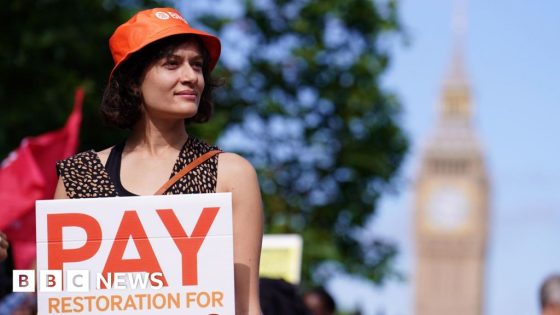Two days before former President Donald J. Trump was booked at an Atlanta jail on his fourth indictment, he held an event at his golf club in New Jersey for another group of people facing criminal charges: rioters accused of storming the Capitol on Jan. 6, 2021.
Standing next to a portrait of himself portrayed as James Bond, Mr. Trump told the defendants and their families that they had suffered greatly, but that all of that would change if he won another term.
“People who have been treated unfairly are going to be treated extremely, extremely fairly,” he said to a round of applause at the event last August in Bedminster, N.J. “What you’ve suffered is just ridiculous,” he added. “But it’s going to be OK.”
That private event was emblematic of how Mr. Trump has embraced dozens of Jan. 6 defendants and their relatives and highlights how he has sought to undermine law enforcement when it suits him, while he also puts forth a law-and-order campaign.
Recently, however, his celebrations of the Capitol riot and those who took part in it have become more public as he has promoted a revisionist history of the attack and placed it at the heart of his 2024 presidential campaign.
Despite the nearly 1,000 guilty pleas and convictions that have been secured in criminal cases stemming from Jan. 6, Mr. Trump has repeatedly described the rioters who broke into the Capitol as “hostages” and has started to open his campaign events with a recording of riot defendants singing the national anthem from their jail cells.
He has highlighted the work of the so-called Freedom Corner, a vigil of activists and rioters’ family members who have gathered nearly nightly for almost two years outside the jail in Washington where some of the most violent rioters are being held. This year, when it seemed as if Mr. Trump would go on trial in Washington on charges related to Jan. 6, his aides discussed the idea of him visiting that jail, according to a person familiar with the discussions who was not authorized to speak publicly. The plan was put off after the trial was delayed.
By doing all of this, Mr. Trump has risked radicalizing his most die-hard supporters even further, encouraging them to repeat events like those that unfolded on Jan. 6.
“It normalizes violence as a legitimate solution to political grievances,” said Robert Pape, a scholar at the University of Chicago who has studied American political violence in the wake of the Capitol attack. “And so it makes it more likely that politically angry people will resort to it.”
Trump Makes the Capitol Attack a General Election Issue
Most politicians would likely have avoided focusing on an episode that shocked the nation as Jan. 6 did, and that polling consistently has shown alienates swing voters. But Mr. Trump has paid increasingly more attention to Jan. 6 in his general election campaign.
Mr. Trump’s attention to Jan. 6 has provided President Biden with apolitical opportunity. Mr. Biden recently invited two Capitol Police officers who were attacked by the mob to speak at one of his own campaign events. As part of his message of seeking to protect democracy, he has repeatedly described the assault on the Capitol as one of the country’s darkest days.
“Trump said that there was ‘a lot of love’ on January the 6th,” Mr. Biden said in a January speech at Valley Forge, Pa. “The rest of the nation, including law enforcement, saw a lot of hate and violence.”
Still, Mr. Trump has a long history of creating alternate versions of reality when it works to his advantage. And as he has struggled to expand his voting coalition over three campaigns, he seems to have recognized that issues surrounding Jan. 6 motivate his base. The subject has helped him strengthen the bond he shares with his supporters by painting them as he likes to paint himself — as victims of a federal law enforcement system run amok.
“I do think he is sincerely concerned about us and our families, and I don’t think he’s doing it just for political reasons,” said Will Pope of Kansas, who attended the Bedminster event and has been accused of, among other things, jamming a flagpole into the Senate carriage doors as the police were trying to close them.
“He’s picked up on the growing concern about the Justice Department and the government in general going hard against American citizens,” he added.
Karoline Leavitt, a spokeswoman for Mr. Trump’s campaign, said the Justice Department under Mr. Biden had spent more time prosecuting Jan. 6 defendants and Mr. Trump than “criminals, illegal immigrants and terrorists.” She added, “President Trump will restore justice for all Americans who have been unfairly treated by Joe Biden’s two-tier system of justice.”
How Trump Has Flipped on the Capitol Riot
Mr. Trump hasn’t always embraced Jan. 6 — at least not openly.
Prodded by his advisers, he publicly disavowed the attack within days of the Capitol being stormed, even though behind closed doors he strongly resisted saying the election was over, according to the House select committee that investigated the attack.
Soon, however, Mr. Trump began to echo the growing attempts to revise the history of the Capitol attack. In doing so, he often followed the lead of far-right lawmakers, including Representative Marjorie Taylor Greene of Georgia, who were in turn following the lead of a small but vocal group of right-wing journalists and activists.
Mr. Trump’s embrace of Jan. 6 not only has meant describing the attack in which more than 100 police officers were injured as a “love fest.” It also has led him to tell a journalist that he wanted to march to the Capitol that day but that his team had prevented him from doing so.
At a rally in Texas in January 2022, Mr. Trump, while teasing his eventual presidential bid, said he would consider pardoning those involved in the assault if he were re-elected — a promise he has often repeated.
A pivotal moment in Mr. Trump’s reversal on the attack came six months later.
In July 2022, one of his aides, Liz Harrington, reached out to Julie Kelly, a conservative journalist who has written extensively about the Capitol attack and the defendants charged with taking part in it.
Ms. Harrington asked what Mr. Trump could do “to bail these people out,” Ms. Kelly recalled. She replied that while there was little he could do about their bail, Mr. Trump should educate himself about the larger legal issues surrounding Jan. 6. Ms. Kelly proposed a meeting with Cynthia Hughes, the founder of the Patriot Freedom Project, a prominent Jan. 6 legal defense fund.
Mr. Trump’s aides initially balked at the idea of sitting down with Ms. Hughes, Ms. Kelly recalled. Ms. Hughes’s nephew, Timothy Hale-Cusanelli, was facing charges stemming from the Capitol attack, but he was also an avowed Nazi sympathizer who liked to take pictures of himself dressed as Hitler.
In the end, however, Ms. Kelly and Ms. Hughes were granted an audience with Mr. Trump at Bedminster in September 2022. Ms. Kelly said that she told the former president he was not doing enough to support the Jan. 6 defendants and that they felt abandoned by him. The two women also told Mr. Trump that some of the federal judges he had put on the bench were “among the worst” when it came to handling the hundreds of criminal cases stemming from the Capitol attack.
After the meeting, Mr. Trump gave $10,000 to Ms. Hughes’s organization. Around the same time, he told the conservative radio host Wendy Bell, “I’m financially supporting people that are incredible, and they were in my office actually two days ago.” Mr. Trump later gave a video statement of support at one of the organization’s fund-raising events at a hotel in Washington.
“People have been treated unconstitutionally, in my opinion, and very, very unfairly, and we’re going to get to the bottom of it,” he said in the video.
Mr. Trump also called Micki Witthoeft, the mother of Ashli Babbitt, a rioter who was shot and killed by a Capitol Police lieutenant on Jan. 6 and who is viewed by many on the right as a kind of political martyr.
“He said he talks about Ashli and he thinks about Ashli and that he has her on his heart,” Ms. Witthoeft said in an online video, in which she recounted the call with Mr. Trump at one of her nightly protests at the Freedom Corner.
Mr. Trump’s aides and congressional allies, like Ms. Taylor Greene, also got him interested in what they described as the poor conditions that Jan. 6 defendants were living under in the Washington jail. But those conditions long preceded the arrival of the rioters, and at this point the jail houses only about 15 or 20 them.
By that point, Mr. Trump had hired Joanna Miller Wischer, a former aide to Peter Navarro, who was previously Mr. Trump’s White House trade adviser and is now in prison for contempt of Congress because he defied a subpoena from the Jan. 6 House committee. She began a job with Mr. Trump’s political action committee and soon became an advocate of sorts within the campaign for Jan. 6 rioters.
Another issue helped to shape Mr. Trump’s thoughts on the Capitol attack and those who took part in it: the spectacle of the televised hearings that were held throughout that summer and fall by the Jan. 6 House committee. Mr. Trump was furious, according to a person with direct knowledge of his thinking, as he watched several of his former aides testify in public about his inability to admit defeat in the 2020 election and his inactivity in the face of the violence on Jan. 6.
How the Jan. 6 Prisoners Became ‘Hostages’
Mr. Trump’s use of the term “hostages” to describe those charged with taking part in the Capitol attack has been one of his most outlandish attempts to alter the history of Jan. 6. The word, at least as he has used it, expresses little beyond a baseless and distorted view that anyone who has been touched by the criminal justice system because of their roles in the riot has been treated unfairly.
During the Justice Department’s vast investigation of the Capitol attack, the number of defendants jailed before their trials has tended to hover around 5 or 10 percent of the total number charged. But that number has decreased significantly in recent months.
And the defendants jailed before their trials were among the most violent rioters, accused of shooting a pistol in the air while standing on scaffolding above the mob, plotting to murder the F.B.I. agents who investigated them and other serious crimes.
One of Mr. Trump’s associates said they realized that the former president started to use the term “hostages” in the months after he recorded a version of the “Star-Spangled Banner” with the so-called Jan. 6 Choir, a musical group composed of rioters serving time in a Washington jail. Mr. Trump has insisted on playing the song at some of his rallies and has also played it at times at Mar-a-Lago, his Florida residence, where, in some cases, all the diners on the patio rise during the display and put their hands over their hearts.
One of the recording’s producers was Kash Patel, a close aide to Mr. Trump who served in a top Defense Department role in the final days of his administration. Through a spokesman, Mr. Patel denied that he had any role in persuading Mr. Trump to use the word “hostages” in his speeches.
Last month at a campaign event in Ohio, Mr. Trump stood by as an announcer asked the crowd to rise for “the horribly and unfairly treated January 6th hostages.” Then, after saluting as a recording played, Mr. Trump repeated the word.
“You see the spirit from the hostages, and that’s where they are, is hostages,” Mr. Trump said, adding that the men were also “unbelievable patriots.”
Several critics, including some federal judges who have handled Jan. 6-related cases, have said that legitimizing the events of that day increased the risk that something similar could happen again.
A prominent judge in Washington, Royce C. Lamberth, earlier this month, while sentencing a man who assaulted the police on Jan. 6 to more than seven years in prison, worried aloud about Jan. 6 becoming “a precedent for further violence against political opponents or governmental institutions.”
“This is not normal,” Judge Lamberth said. “This cannot become normal. We as a community, we as a society, we as a country cannot condone the normalization of the Jan. 6 Capitol riot.”
Michael Gold contributed reporting.
Source Agencies




